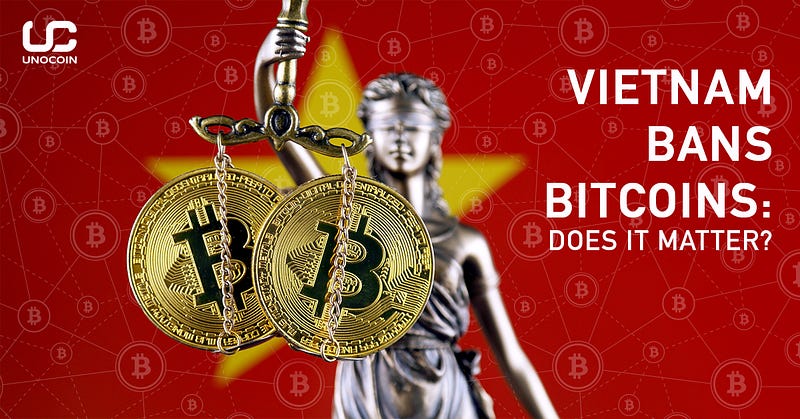
In the Eastern Pacific in recent times we’ve seen heightened geopolitical focus with the Chinese claim on the South China Sea, the US’s militarized attempt to beat it back, the Philippines and its war against drugs and ISIS, Vietnam and its proxy wars to the south west of its borders. But in the world of cryptocurrencies, one incident takes precedence — the Vietnamese ban on Bitcoin.
The SBV (State Bank of Vietnam) has issued a statement that it is “developing a completely new framework for [monitoring and regulating] cryptocurrencies”.
After the Indonesian ban on Bitcoin, the Vietnamese Government issued a public statement on the 30th of October, that deemed Bitcoin exchanges and payments illegal, “According to the provisions of the law, Bitcoin and other virtual currencies are not lawful means of payment in Vietnam; The issuance, supply, use of bitcoin and other similar virtual currency as a means of payment is prohibited in Vietnam.” The Vietnamese government has slapped a hefty fine — around $9000 dollars — on offenders.
Many credit this as an immediate response to lobbyists within the country who are now beginning to lose a foothold in the market due to the introduction of new technologies — all foreign. For example, quite recently Vietnam saw a nation-wide taxi protest that was sparked by rage against Uber. Traditional industries and services — transport, delivery, and food — have all been disturbed, causing the Vietnamese government to relook and adopt a new framework to meet this technological change.
Does this matter?
But does this mean anything to the Bitcoin community at large? Since the ban, bitcoin has still continued to rise in price. It still holds strong.
With the recent sweep of countries now making concrete decisions to regulate or cease Bitcoin activity, the global Bitcoin market has remained unhurt and has even gone ahead and seen a record high of $16,000 earlier this week.
Many consider the current situation akin to that stipulated by the Satoshi Nakamoto Institute — that the world is about to have a hyperbitcoinization period, where countries on the fringe of financial security, those prone to heightened inflation rates and poor savings etc. will begin to adopt Bitcoin as the standard of payment and financial exchange.
And this theory does hold true; the digital transformation taking place in India, the legalisation and adoption of bitcoin by countries all over the world (Estonia, the USA, South Korea and Canada are examples of a few). The economic crisis taking place in South America and the heightened socio-political tensions in North Africa are markers and conditions that show that Bitcoin is only going to be, and actually is valued quite highly and is no longer the fringe desire of a few.
This isn’t to say that there isn’t a sudden wave of determination taking place in the South Asian quadrant of the world. The last event to cause a significant drop in valuation was the Chinese decision to halt all mining activity and seize all domestic holdings, under the premise that the initial IPO was unregulated and deeming all holdings to be illegal.
This was a serious event, affecting the world’s largest and most influential Bitcoin community. Even so, the dip to $4447 in September is completely overshadowed by the current high that Bitcoin is riding. There is a balancing act taking place within the Bitcoin market, but taking place under the general umbrella of adoption or rejection. A large number of countries around the world have made their first foray into the bitcoin market, whether to gain from it or to put a stop to it. And in this balancing act, the number of adopters have overturned any skepticism.
What is key to look for are signs that Asia, the world’s quickest growing market remains up to date with the world-changing technology that is Bitcoin. In India, the Reserve Bank has set up an investigative committee to look into Bitcoin, after a lot of socio-economic pressure. Some theorists believe that the Chinese hold on Bitcoin activity was only temporary, with some ulterior motive at play. Other influential S.E Asian countries have already accepted Bitcoin, with Japan and South Korea being the pioneers here.
Conclusion
As such, the Vietnamese ban on Bitcoin remains irrelevant to the Bitcoin trajectory for a variety of reasons, but these are the important ones;
- The size of the Vietnamese community is negligible, and the number of exchange services and users is more so.
- The theory of hyperbitcoinization holds true, with Venezuela and Zimbabwe as ”in-practice” markets and South Korea, Japan and India as adopters.
- The overall Asian Bitcoin market is held in a few countries and in great numbers, these countries have remained unaffected.
- Countries, institutions, groups the world over have adopted Bitcoin, making a high-value investment.
In fact, Bitcoin’s current performance is markedly higher than Wall Street estimates of $6000 by mid-2018. The same Wall Street now says $25,000 is a conservative estimate.



